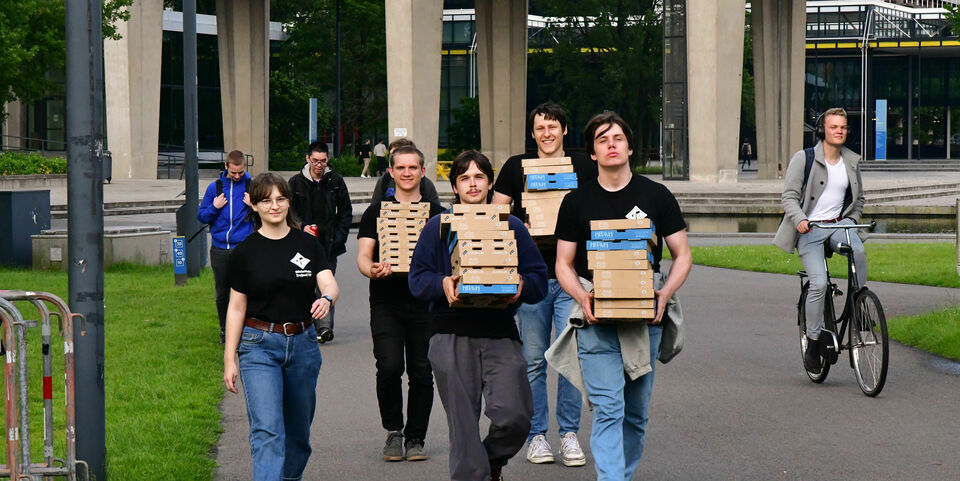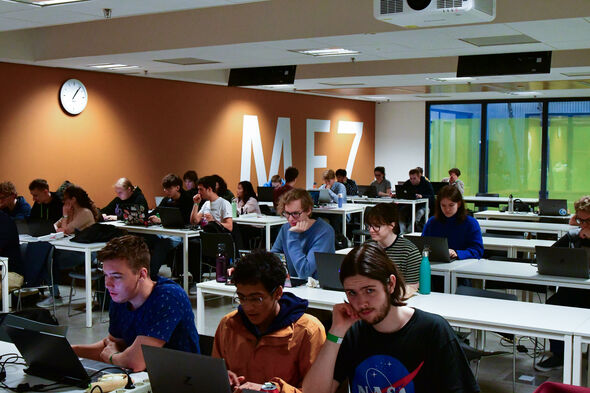“It’s impossible to describe just how well things have turned out,” initiator Rijkman Pilaar begins. In 2023, he was a Computer Science student and came up with an idea. “I found it strange that a university with a strong focus on cybersecurity didn’t have an association for its application. I expected a close-knit community and wanted to be part of that, because in my experience, ethical hackers are tolerant and understanding.” Pilaar did notice that some attempts had been made in the past: “For example, I found Hackhouse.team on Insta, but their last post was from December 8, 2022.”
The decisive moment for Pilaar to set up his own association was when his chairmanship at debating association Chronos came to an end last May. Together with three friends, all of whom were following the Competitive Programming and Problem-solving track at the Honors Academy, he sat down to consider the options. They saw great potential for an association dedicated to ethical hacking.
Capture The Flag
Techna Huynh, Gabrielius Rosinas, Teun Peters and Rijkman Pilaar realize that simply organizing lectures on hacking does not build a community. “But there is already a competition format where you can actively work together in this field, the so-called CTF competition. The letters stand for “Capture The Flag”, because the goal in these competitions is often to retrieve a piece of text. That “flag” then serves as proof that you’ve successfully completed a challenge. An example of a challenge might be to exploit a website misconfiguration to gain access to the server. Or, for example, a steganography challenge, where you’re supposed to extract information from an innocent-looking image. And there are many more types of challenges.”
In their second year at the Honors Academy, Huynh and her two groupmates decided to organize a TrojanCTF as a project. Pilaar started working on a policy plan for ESHA Trojan and looked for sponsors. That first TrojanCTF had only eighteen participants, but the four friends saw it as a very successful pilot. The next Whitehats TrojanCTF that took place on May 25, 2024, hosted 120 participants and had a budget large enough to provide a thousand euros in prize money as well as free pizza for everyone, partly from selling the naming rights to computer security company Whitehats.
Mission
Trojan has four main objectives. “We want to offer training on a structural basis, make CTFs more accessible to everyone, create a social cybersecurity community and organize an annual CTF at TU/e,” says Pilaar. But he also has a personal goal.
“I’d like to establish an association at my alma mater. My father founded a society at Nijenrode, and I know how much fun it is for him to meet up with those people every year. I’d like to remain a part of Trojan’s ALVs (General Meeting of Members) for the rest of my life.”
Trojan’s first board is now stepping down due to master’s programs abroad. Unlike many other student boards, Pilaar had no trouble finding successors. I talked to professors and asked them if they knew any suitable candidates. I then reached out to them. There are six candidates now. I don’t know if that's too many; the new board will have to decide on that.”
The six candidates will be provided with a solid network and a policy plan. One of their first tasks will be to register with the Chamber of Commerce. Trojan can already be found in the TU community overview that lists 109 associations.



Discussion